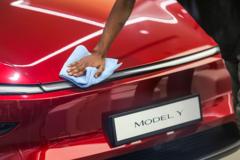Can Tesla Deliver Affordable Cars Amid Growing Challenges?

Tesla's Strategic Shift: Building Cheaper Cars and Self-Driving Software Approval in Europe
Tesla, the electric vehicle giant founded by Elon Musk, is undergoing a significant transformation in response to recent market challenges. After experiencing a notable downturn in car deliveries and profits, the company has announced plans to manufacture more affordable vehicles and secure approval for its self-driving software in Europe. This shift aims to revive its struggling business amidst increasing competition and evolving regulatory landscapes.
As the automotive industry is rapidly evolving, Tesla is not exempt from the pressures of market dynamics. The company has begun the first builds of its cheaper model, a move that could potentially reinvigorate sales and attract a broader customer base. Investors are eagerly watching these developments, particularly after Tesla reported a 12% decline in revenue in the last quarter, marking its steepest drop in over a decade.
The Current Landscape for Tesla
Tesla faces multifaceted challenges, including reduced support from the US government for electric vehicles, fierce competition from Chinese automakers, and a reputation that has been affected by Musk's political activities. These factors have combined to create a turbulent environment for the company. For instance, Tesla's CFO, Vaibhav Taneja, highlighted that the changes in US tariff policy had cost the company around $300 million in just three months.
Moreover, the expiration of tax credits for electric vehicle buyers in the US is expected to further impact sales. These financial constraints have led Tesla to issue caution regarding its outlook for the year, indicating that it is "difficult to measure the impacts of shifting global trade and fiscal policies." As a result, the company has been compelled to reassess its strategies in response to these significant challenges.
Initiatives for Revitalization
Despite these challenges, Musk remains optimistic about the company's future in Europe. He believes that once customers are permitted to utilize Tesla's self-driving software, sales will experience a significant boost. Musk specifically mentioned the Netherlands as a potential location for the first approval, but he also expressed hopes to secure the green light from the European Union, which he described as having a "Kafkaesque" bureaucracy.
This belief in the transformative power of autonomy reflects Musk's core vision for Tesla. He stated, "Autonomy is the story. Autonomy is what amplifies the value [of the company] to stratospheric levels." The ability to leverage self-driving technology could indeed redefine Tesla's market position, provided they can navigate the regulatory hurdles effectively.
Challenges to Profitability
Although the potential of self-driving technology is promising, Tesla's profit margins have faced significant pressure. The company has reported declining profits in five of the last six quarters, raising concerns among investors and analysts alike. The stock has seen a dramatic decline of approximately 30% since its peak last year. This financial instability has prompted discussions regarding Musk's leadership and the sustainability of his political engagements.
In recent months, the leadership of Tesla has faced scrutiny regarding Musk's dual role as CEO and his involvement in political affairs, particularly his support for former President Trump. This intersection of business and politics has not only raised eyebrows but has also led to calls from investors, such as James Fishback, for the board to assess whether Musk's political ambitions are compatible with his responsibilities as the CEO.
The Investor's Perspective
Investor sentiment is critical for Tesla's recovery, and recent events have created a mixed atmosphere. Analysts like Dan Ives have urged the board to implement measures to ensure that Musk's political endeavors do not detract from the company's performance. In response to these pressures, Musk's comments on social media, including a public retort to Ives, have only added to the uncertainty surrounding Tesla's future.
Daniel Binns, the global CEO of brand consultancy Elmwood, noted that Musk's controversial behavior has eroded some of the passionate support Tesla previously enjoyed. This decline in brand loyalty is particularly concerning as the company faces stiffer competition from other electric vehicle manufacturers. Binns indicated that simply launching a new model may not be sufficient to address Tesla's current issues; a comprehensive strategy that encompasses innovation and customer engagement is vital.
What Lies Ahead for Tesla?
As Tesla continues to navigate the complexities of the automotive landscape, the question remains: how effective will their strategy of building cheaper cars and pursuing self-driving software approval truly be? The company's trajectory hinges on its ability to adapt to market demands, regulatory requirements, and competitive pressures. While the introduction of a more affordable model is a step in the right direction, it must be accompanied by a robust marketing strategy and a renewed focus on customer relations.
Key Takeaways
- Tesla is launching a cheaper model to revive sales amidst declining profits and deliveries.
- The company faces challenges from US government support cuts, competition, and Musk's political activities.
- Approval for self-driving software in Europe is seen as a potential avenue for increased sales.
- Investor concerns about Musk's political involvement and its impact on the company's direction persist.
- The sustainability of Tesla's market position will require more than just a new vehicle model; innovation and a strong brand strategy are essential.
Frequently Asked Questions
What is Tesla's plan for producing cheaper cars?
Tesla has initiated the first builds of a more affordable model, aiming to attract a broader customer base and revive its sales performance. This strategic move comes in response to declining profits and increasing competition in the electric vehicle market.
How does Tesla plan to gain approval for its self-driving software in Europe?
Elon Musk has expressed optimism about securing approval for Tesla's self-driving software in Europe, specifically mentioning the Netherlands as a key location. The company hopes to navigate the complex regulatory environment of the European Union to bring its autonomous technology to more customers.
What challenges is Tesla currently facing?
Tesla is grappling with several challenges, including reduced government support for electric vehicles in the US, heightened competition from Chinese manufacturers, and the impact of Elon Musk's political activities on the company's reputation and investor confidence.
How has Elon Musk's political involvement affected Tesla's business?
Musk's political involvement, particularly his support for former President Trump, has raised concerns among investors about its compatibility with his role as CEO. This has led to scrutiny of his leadership and calls for the board to assess the implications of his political ambitions on the company's performance.
What does the future hold for Tesla?
The future of Tesla hinges on its ability to effectively implement its strategy of producing cheaper vehicles, securing self-driving software approvals, and managing investor relations. Success in these areas will determine the company's ability to maintain its position in the competitive electric vehicle market.
As Tesla moves forward, it remains to be seen how these initiatives will play out and whether they will be enough to restore investor confidence and market share. Will Tesla's focus on affordability and autonomy pave the way for a brighter future, or will it struggle to keep pace with the evolving automotive landscape? Only time will tell. #Tesla #ElectricVehicles #ElonMusk
Published: 2025-07-23 23:00:11 | Category: technology



